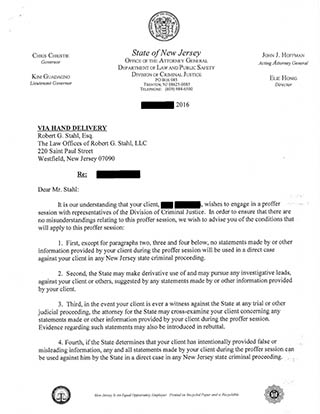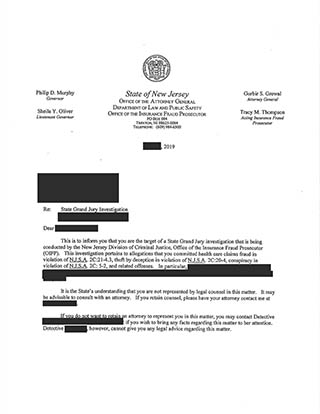We receive many calls over the course of the year from potential clients, telling us they received a “target letter” from the U.S. Attorney’s Office or State Attorney General’s Office and that they are considering whether to go to an interview with law enforcement under a “proffer agreement.”
When approaching these topics, our firm ensures that clients are fully informed and aware of every possibility before taking such an important step. The first task is to confirm that the client fully understands what a target letter means. Such letters explicitly state that the person is the target of a criminal investigation, meaning the government believes that it has evidence that the person committed one or more federal or state criminal offenses, and is looking to potentially charge them.
Target letters are used to get the client’s attention and are often meant to entice them into meeting with the investigating authority for an interview. Typically, the letter indicates that the client has 7 – 10 days to have their attorney contact the prosecutor with any facts they may want to bring to the prosecutor’s attention. Often, they advise that if the person does not have an attorney, they may contact the investigator directly. It is critically important for the person to retain experienced criminal defense counsel before responding to a target letter. After the attorney makes contact, the government typically pushes to have the client brought in for a proffer, a meeting limited in scope, conducted for the purpose of having the client give the government information.
Before a proffer meeting is scheduled, the prospective client must understand the very limited protections of a proffer agreement. The agreement purports to protect the client/target from incriminating themselves by prohibiting the government from directly using anything the client may say during the meeting against them later at trial. The distinction is best thought of this way – if the client simply agreed to speak to an investigator by themselves, anything the client said could be used against them in the prosecution’s case in chief, and is akin to a confession. The investigator could take the stand and testify that the client divulged incriminating information. Under a written proffer agreement, anything said during the proffer by the client cannot be used directly against him at trial. However, the proffer agreement allows law enforcement to use any information provided by the client in a number of ways.
First, the agents or investigators can go out and collect evidence or statements from others based upon any information provided by the client. That is called derivative use of the information and the prosecution can use that evidence, even though they only learned of it from the client.
Second, the information can be used at trial against the client to impeach his testimony, if he testifies and contradicts what he said in the proffer. 
Third, and perhaps most damaging, the client’s defense attorney cannot put on witnesses or cross-examine government witnesses in a manner that would contradict what the client said during the proffer. For instance, if the client said that he was at a meeting with the coconspirators when drug sales were discussed, the defense could not argue that there is no proof of the client’s attendance or put on a witness that claims the client was elsewhere, as it would be contrary to what the client said during the proffer, allowing the proffer statement to be used for impeachment purposes.
Agreeing to a target proffer is a very serious step that can only be decided after sufficient facts are known about the case and the client’s exposure is understood. In rare instances, it could be used as an innocence proffer, where the client and his attorney try to convince the government that they are mistaken and that the client should not be charged. In the typical scenario, however, it is a calculated step toward cooperation and a plea. Thus, before even considering whether a client should proffer, experienced defense counsel and the client must review the type and strength of the evidence against the client, and whether the client has sufficient information that could assist the government in its investigation and earn the client a better plea or sentence. It should never be to “just see what the government has” and talk about the case.
Stahl Gasiorowski Criminal Defense Lawyers aggressively defend organizations and individuals charged with complex federal and state crimes. Founder Robert G. Stahl is recognized as one of the top criminal defense attorneys in the NY/NJ area for his skills, knowledge and success.
Our offices are located in Westfield, New Jersey and Manhattan. To contact us to discuss your case, call 908.301.9001 for our NJ office and 212.755.3300 for our NYC office, or email us at rgs@sgdefenselaw.com. Or Contact us online.




Leave A Comment